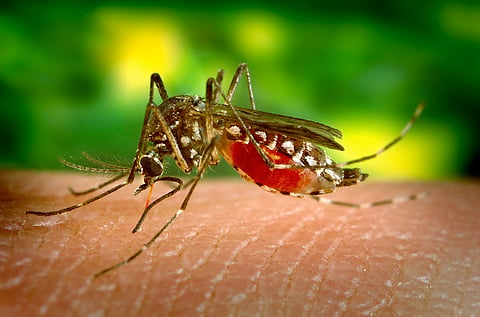

Cases of serious illness and deaths due to dengue are fast increasing in several parts of the country.
By September 6, more than 19,000 cases were reported across India, with 41 deaths among them. Cities and regions like Delhi, Arunachal’s East Siang district, Chittoor in AP, Thiruvanthapuram and Kasargod in Kerala, Bengaluru, Kolkata and Mumbai have al reported high number of cases, according to media reports. With this, the number of cases in India had already doubled compared to 2014.
The intensity of the situation caught our attention last week with two parents in Delhi committing suicide after their child, suffering from dengue and denied treatment at several hospitals, died.
But is dengue really a deadly disease which we cannot control? Why has the situation worsened?
No specific cure
Dengue has no vaccine and it cannot be ‘eradicated’ as such. There are no specific drugs for dengue, the ‘treatment’ for dengue is about maintaining fluid balance in the body and making sure the blood pressure does not fall too low through blood transfusions. One will need complete bed rest. Essentially, if you have got dengue, you just have to take basic care till you get better.
So, that leaves us with only one effective mechanism to fight dengue – prevention.
And what do we prevent? Mosquito bites, because it is the mosquitoes which carry the dengue virus to our bodies.
It’s quite simple – if you don’t want dengue, don’t get bitten by mosquitoes, take measures towards it.
Symptoms
But we must learn how to spot it. Early detection is very important, and chances of death goes down drastically on early detection.
Here are its symptoms - Sudden, high fever, severe headaches, pain behind the eyes, severe joint and muscle pain, fatigue, nausea, vomiting, skin rash, which appears two to five days after the onset of fever, mild bleeding (such a nose bleed, bleeding gums, or easy bruising).
These symptoms may begin four to six days after infection. Even if you have the faintest doubt of it being dengue, visit a doctor for confirmation through a blood test.
Prevention
So what can we do to prevent it?
There are two major strategies.
One, source reduction in the environment around us. This is to eliminate all possible spots where mosquitoes will breed. This has to be coupled with efforts to make people more aware about which are the places – like water coolers, puddles of stagnant water and gutters – where mosquitoes can breed.
Next, we must take personal action to reduce contact to mosquitoes. Close doors and windows, cover yourself fully and use mosquito repellents.
According to National Vector Borne Disease Control Programme, the following specific measures have to be taken,
Remove water from coolers and other small containers at least once in a week
Use aerosol during day time to prevent the bites of mosquitoes
Do not wear clothes that expose arms and legs
Children should not be allowed to play in shorts and half sleeved clothes
Use mosquito nets or mosquito repellents while sleeping during day time